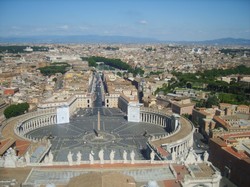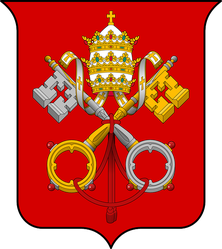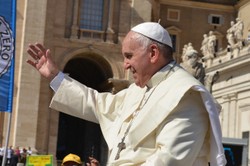As a one-time student for the Catholic priesthood I am aware that the abusers are a tiny minority, but they have got away with their misdeeds because of institutional failings. These include inadequate entry procedures for the priesthood, the way that clerics tend to support each other at the laity's expense, and celibacy. Changes of teaching are not needed, but a change of culture would be important, and much has been done already, but more is needed.

Corruption in the church:reflections on scandal
by frankbeswick
The child abuse problems in the Catholic church are caused by a minority who have exploited institutional failings
Youthful experience
In 1967 as a teenager I set off for Catholic seminary, theological college, in London to train as a priest, where I spent two years before moving on to Ireland, on the border between North and South, an interesting time when the troubles were starting, though I saw no violence. I stayed a year at the White Fathers seminary there [now closed] before concuding that it was not for me. I was never ordained. During these three years I met many good people, and some flawed people, but no bad ones. I left not because of any crisis of faith, I am still a practising Catholic, or because of any sexual issue. While I have been happier and more emotionally settled as a married man, celibacy played no part in my decision. What happened is that I found out more about myself. I realized that I did not fit in and that I was more interested in working in education than the clerical life. I was yet to realize that I find institutions difficult and that my proper niche is freelance tutor and writer, but that's another story.
During these three years I did not encounter any abuse at all, either from priests or students.In the Irish theological college we had boys' and girls' clubs for the local children, and I worked in both, and I can guarantee that no abuse was happening there , as I strictly supervised both clubs. When all this abuse scandal broke out I was surprised as many other Catholics were, for I had not encountered any of it in my life at or after seminary. What I, like many other Catholics did not know, is that the abuse was happening in secret. So now, as a Catholic of sixty two years old with a background in the religious life, what are my thoughts on the clerical abuse issue?
Security or lack of it
When I entered college I filled in a form, one of whose questions were whether I had any convictions. I had none and there were none pending. There never have been. My headteacher had to provide a reference, and he would have known if there was any stain on my record, but besides having to obtain a reference from my parish priest about my good character, that was that. But don't be shocked at the laxness. This was normal for British society at the time. No one thought that police checks were necessary. Things are much stricter nowadays.
Another problem is that men entered the seminary when they were eighteen or so, though there were always older men. At the age of eighteen your personality is not always well formed, and you may later develop personality traits that are not evident earlier in life. You have not been tested in the more stressful situations that bring out your weaknesses, and no one can know what you are going to be like under pressure, whether that be the pressure of a stressful situation or longstanding burdens like celibacy. Nowadays men are expected to enter a bit later in life, having had some life experience, maybe a degree or some time in a job. They are more aware of their own traits than they were in their teens, and their character is better formed.
Entryism
This is the most worrying problem and it can only be stamped out with vigilance. At all times in the church's history there have been people who entered the priesthood for the wrong reasons. This has been a problem since the Middle Ages at least. This problem always occurs in places and times when the church is strong and secure and where therefore there are benefits to be gained from the priesthood. Ireland was a case in point. The Irish respected their priests and were generous to them, so the sometimes the priesthood drew people who were not rightly motivated. Sometimes these were people who were drawn by status, wealth and power, but there must also in several countries have been people drawn by darker purposes, the opportunity to manipulate and abuse. It is a good thing that the ruse has been uncovered and these people are getting their just deserts.
One important point is that anyone who enters with a false motive is having to put on an act. He will have to feign conformity. This is quite easy. You may not be aware that religious institutions full of young men can be argumentative places, where people who are serious about their religion and its implications for society will sometimes furiously argue their cases. They will argue with each other and sometimes with the superiors. This is a sign of sincerity, but the person who has entered for wrongful motives will not be as keen to argue, as he is uninterested in truth.He will affect conformity to doctrine and will never publicly disagree about anything. He will seem devout, but he is not. In a system that values conformity, such a person can easily sneak through. That this can happen suggests that part of the remedy is to value conformity less than has been the case.
Yet I suspect that complete cynics are few in number. It seems likely to me that some people enter the priesthood for good motives but hang on to darker urges and do not admit to them or try to overcome them. Temptation is a fact of life, but some people give in to it and let it get them into habits of bad behaviour. I believe that these people have been responsible for much of the abuse that has occurred. There is no excuse: Christianity states that we are all sinners, but that we are responsible for trying to overcome our urges. Plenty of help is available in the religious life for anyone who feels an urge to abuse [or any other urge for that matter.] It is up to them to make use of the help available.
Clericalism
It was once said by George Bernard Shaw, I think, that all professions are a conspiracy against the public. Given Shaw's capacity for superficial statements masked as profundity, I think this is an exaggeration, but there is some truth in it. Clerics are a profession and therefore subject to the professional vice of sticking together against the public. They become defensive of their own. This is not always the case, as there are many priests who would report abuse and have done so, and generally they would act to stop it. But have they always been keen to report the abuse to the police. Sadly no. Some abusive priests have been merely moved on, ony in some cases to offend again.
Sometimes the protection of offending priests was merely misguided. Catholics have a great belief in the possibility of repentance and change. They hope that by spiritual counselling they can guide the miscreant to return to higher standards of behaviour. The non-religious world is more sceptical about penitence, believing that abusers are incurable. Perhaps the truth is that the urge is not curable in some people, but the will to behave well and refrain from abuse can be improved. Thus moving an abuser on was never supposed to be a let-off. The abuser would have been counselled to improve, but it was not enough. Catholic teaching derives from pope Gelasius in the fifth century, who argued that church and state are parallel institutions that can both make claims, so both can make binding demands, so the state can require that abusers be brought to justice.The church owes respect to the state, just as the state should respect the rights of the church[es].
In the past few years pope Benedict, who quietly established fast track procedures for getting rid of clerics who abuse, decided that abusers could never again serve as priests. I suspect that as the issue is now in the open, the church is less attractive to people who have darker motives for entering the ministry.
Celibacy
I had better say where I stand on celibacy. I do not believe that it should be compulsory, as it is depriving the church of the services of many good men. I am also a believer in women priests, and the sooner we have them the better. But I think that the contribution of celibacy to the abuse problems is overstated. Most of the abuse has been adult male upon boy, so it expresses urges that could not be cured by allowing priests to marry. While there have been some cases of male abuse upon girl, they are rarer, because when heterosexual priests go off with a female it is usually a mature, adult woman and is consensual.
How far does celibacy contribute to problems? I did not find it a burden when I entered the religious life, but perhaps I was not conscious of my emotional need. I only had to bear it for three years. I suspect that with some people it may become a burden that grows with time, and with burdens come temptations. Stress can bring out sides of our characters of which we were previously unaware. Some people cope well with celibacy, some do not, and it is not easy to tell beforehand who will be in which category.
In my opinion the solution is to have people coming into the priesthood at a more mature stage of life and to abandon compulsory celibacy. This might mean having part time priests who have other jobs besides the priesthood, but this is no bad thing, as it will break down barriers between priests and laity.
Reflections
The church has never been free of problems, and I think that it never will be. It is an organisation that aspires to high standards for all of humankind, not merely for a selected elite, so its faults appear all the more glaring. There was a mediaeval saying "Sancta Ecclesia semper reformanda" which means Holy Church always to be reformed." Without constant discipline and renewal the church fails. Today, as I write, the cardinals are meeting in conclave to elect a new pope. Whoever he is, we need a pope who will be a constant force for reformation in the church and purify it of the evils which obstruct its mission.
You might also like
Conclave: a reviewConclave is a film which covers the secretive and fascinating process of el...
Hope: a reviewHope is the autobiography of Pope Francis detailing his life from early child...



 Darkness over the Earth the skies darkened when Jesus was crucified17 days ago
Darkness over the Earth the skies darkened when Jesus was crucified17 days ago
 TheThousand Year Gardenon 11/26/2025
TheThousand Year Gardenon 11/26/2025
 Women of the Gospelson 10/11/2025
Women of the Gospelson 10/11/2025
 Religious Gardenson 08/25/2025
Religious Gardenson 08/25/2025


Comments
I don't know how that would work out, sorry.
P
The first paragraph to the second subheading, Security or lack of it, considers that "When I entered college I filled in a form, one of whose questions were whether I had any convictions. I had none and there were none pending."
The film The accountant deals with a government analyst who furnished false information on her original job application. A superior finds out about her juvenile record and gives her a chance to get it re-expunged.
I know of the above as fiction.
But how might one fill out a Church-related application?
Must such an application offer an expunged record or would what works legally as non-existent work that way on a Church priesthood-related form?
Yes. The responsibility lies with the local bishop.
Thank you!
A priest in a southwest Virginia Church indicated that he made second-youngest priest status in the entire Commonwealth! The first-youngest was not that far behind him.
The second-youngest was in his 30s.
His successor was in his 60s and was there for 10-plus years. It was the first assignment for the 60-plus-year-old's successor who was in his late 20s or very early 30s.
Would there be access to special advice from the diocesan office for such "young'uns" ;-D?.
Entry is at least twenty one. The average is probably late twenties.
Thank you!
The second paragraph to the second subheading, Security or lack of it, considers that "Nowadays men are expected to enter a bit later in life, having had some life experience, maybe a degree or some time in a job."
What might be the average age range of 21st-century priests?
The word selecting is probably more apt than enrolling.
Enrolling candidates can be perceived as a clerical position in the United States. There can be a non-clerical position held by someone who is upward bound professionally or by someone with similar experience and responsibilities from elsewhere.
For example, a business management degree or an education degree with a teaching certificate may open unexpected doors.
Might enrolling candidates involve a clerical (in the sense of paper-pushing ;-D. not priestly qualifications) worker or an administrative staffer?
My feeling is that materialism was not the cause of inadequate entry. I think that the issue was due to incompetence among those doing the enrolment of candidates for the priesthood.
The second sentence to your introduction advises us "inadequate entry procedures for the priesthood."
Might such entry procedures always have existed so or might something, such as increasing materialism, be responsible for their emergence?